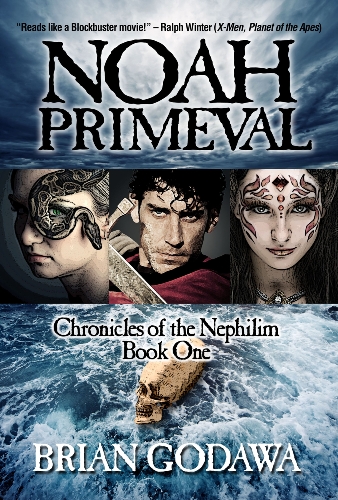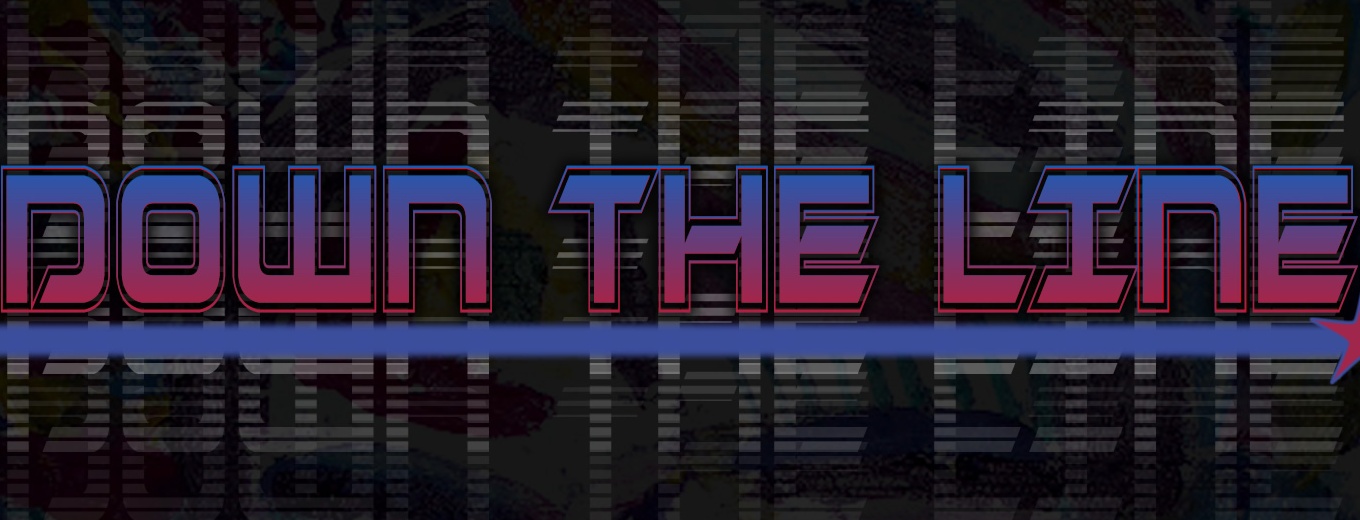(Intro by Matt Crosslin)
I love science fiction and fantasy. I am less than enthusiastic about what passes as either genre in Christian bookstores. There are a few good books out there in the Sci-Fi/Fantasy genre, but they are few and far between. When I heard that Indest was interviewing Brian Godawa, I was intrigued. Then I saw Noah Primeval for free through Kindle and decided to give it a shot. So far, I am hooked.
I like is that nothing about Noah Primeval is sanitized. But what I love is that it also is written in a universe where the cosmic structure that ancient cultures believed in is real – the Earth is flat, supported by pillars, etc. Yes, we know this is not true – but alternate universe structures are interesting ideas to explore that few authors do. Ted Chiang did an excellent job of it with his short story Tower of Babylon in 1990… but others are few and far between.
I doubt you will see Noah Primeval on many Christian bookstore shelves… which makes it a perfect book for our readers to check out. But Godawa has an even deeper connection with the alternative music subculture we all love. Read on as Mike Indest digs deeper into the world of Brian Godawa…
 Noah Primeval challenges the way most Christians view Genesis, it is also addresses sinful depravity with a stark grittiness. Why do you think it was important to tell the story in that manner?
Noah Primeval challenges the way most Christians view Genesis, it is also addresses sinful depravity with a stark grittiness. Why do you think it was important to tell the story in that manner?
The Bible says this “antediluvian” time period before the flood was so wicked that “every thought of man’s heart was only evil continually,” and “the earth was corrupt in God’s sight, and the earth was filled with violence.” I wanted to go no shorter and no further than the Bible in depicting this fallen world. Most of the extreme wickedness I just hinted or implied as does the Bible, but like the Bible, I could not avoid such sins without demeaning the power of justice and the grace of God. No matter how bad it gets in this world, the power of God is greater than the power of evil. The violence in the novel is similar to The Lord of the Rings: there are some really diabolical monsters and some battles of Orcs, or rather, Nephilim giants, but it is a fantasy environment, and I try to keep it tolerable.
I’ve heard some of our most revered preachers explain Genesis 6 as “the sons of Cain” and that the spies sent to Canaan were so scared that they only imagined they saw giants. Why does your interpretation of these events differ from the common held beliefs?
The human interpretation of the “sons of God” in the Bible is certainly one of several possible ones within orthodox Christianity. The problem is that it lacks textual support, which explains why some believe the “sons of God” to be “sons of Cain” (evil) and some believe the exact opposite that they are “sons of Seth” (righteous). The dominant interpretation through most of Church History has been the supernatural one that these “sons of God” were divine beings of God’s heavenly host. I believe in the supernatural interpretation that these beings were angelic. In the novel, I put some appendices at the back to explain the Biblical research for this conclusion. The one-two punch is that the “sons of God” is explicitly defined in the Bible as the angelic heavenly host in Job 1 and 2 and 1 Kings 22. They are a “divine council” that surrounds God’s throne, praises him, engages in legal counsel, and does God’s bidding (Also see Psalm 82 and 89). You can’t get any more explicit than that. Oh wait, yes you can. The New Testament reaffirms the interpretation that angels sought sexual union with humans in Jude 6:6-7 and 2 Peter 2:4-10. Jude even goes so far as to quote a non-canonical book of Enoch in Jude 14-15 that refers to God coming in judgment for sins like the angelic ones performed above.
Regarding the giants, It is pretty difficult to maintain “giants” as being metaphoric language or illusion when the Scriptures define the Anakim as a “tall people” throughout the conquest texts (Num. 13:33; Deut. 1:28; 2:10, 21; 9:2) and then give us the height of some of these as about 9-10 feet tall (Goliath) and about 12 feet tall (Og of Bashan), as well as the weight of their weapons and armor as being gigantic. That’s not imagination, that’s observation. The Bible also describes about 12 different tribes or cities of giants as distinct from other cities in Canaan, and even gives us the names of about 12 different specific giants who were killed, from Ishbi-benob (2 Sam. 21:16) to an unnamed giant (1 Chron. 20:6) and others. You can get the full documentation in my appendix on the Nephilim in Noah Primeval. In fact, it seems as if Joshua is deliberately targeting the giant clans to utterly destroy out of the land (Josh 11:21-22).
Noah Primeval references the book of Enoch. Enoch also seems to also be quoted in the book of Jude. Are there other New Testament references? Do you know what was the early church father’s view on Genesis 6?
There is a great article I put on the website in the Links section entitled, “The Ancient Exegesis of Gen. 6:2,4” by Robert Newman for Grace Theological Journal (godawa.com/noah_primeval/links.html). It chronicles the fact that the majority view of the Church fathers was that Genesis 6 was talking about angels having sexual relations with humans. But that Augustine, with his autobiographical fear of gnosticism, really helped to make the non-supernatural interpretation rise in popularity. Also, the book of Enoch, though pseudepigraphal and non-canonical also has an erudite history of respect within orthodox Christianity. Which it ought to, since the New Testament apostolical authors took it seriously enough to paraphrase it and quote it in Jude and 1 and 2 Peter. It’s kind of weird to me that some Christians seem to think that if some text is NOT Scripture, then it’s NOT true, therefore they refuse to even consider texts like 1 Enoch because they assume them to be “lies” or false. Sorry, but that attitude is just not Biblical, especially since the Biblical authors actually TOLD US that they used over twenty different non-canonical books as sources to write the Biblical text, such as The Book of the Wars of Yahweh (Numbers 21:14), The Book of Jasher (Joshua 10:12-13; 2 Samuel 1:19-27) and others.
Do you think that this book will be more accepted with a non-Christian audience since they will probably not read it with the same preconceptions? Who is your target audience?
My target audience is Fantasy lovers who also like spiritual fantasy, including those who enjoyed The Lord of the Rings and The Chronicles of Narnia, those who are not afraid of enjoying their imagination when it comes to their faith, or even lack of faith. But also, those who enjoy speculative historical religious fiction.
Beside the book your website mentions a movie, comic book, video game and a sequel. What’s next for this series?
I am currently writing the prequel novel, Enoch Primordial and hope to have it out this year. Let me tell you, this is even a wilder ride than Noah Primeval, and it shows us the origin stories of the fallen Sons of God, the Nephilim, but also of Semjaza (Anu), Azazel (Inanna), Methuselah and Noah’s parents, as well as reintroduce us to the archangels Uriel, Michael, Gabriel, and Raphael. I will continue to use my ancient Near Eastern research into the mythologies of the time period and will have more fascinating appendices at the back of the book explaining the ancient foundations of my approach.
My goal is to get the series done and growing in readership to be able to warrant investor interest in a video game, graphic novels, and movies.
In a past life you designed Album covers for Frontline. Can you tell us one or two that you are proud of?
Mortal’s first album, Fathom (Industrial grunge)
Crumbacher’s Greatest Hits Time after Time
Magdalen’s Big Bang (Love that Kenny Tamplin! I recently had him do the sound track to a short film I made “Cruel Logic” on my website: godawa.com/Filmmaking/Shorts-Cruel_Logic.html)


Leave a Reply